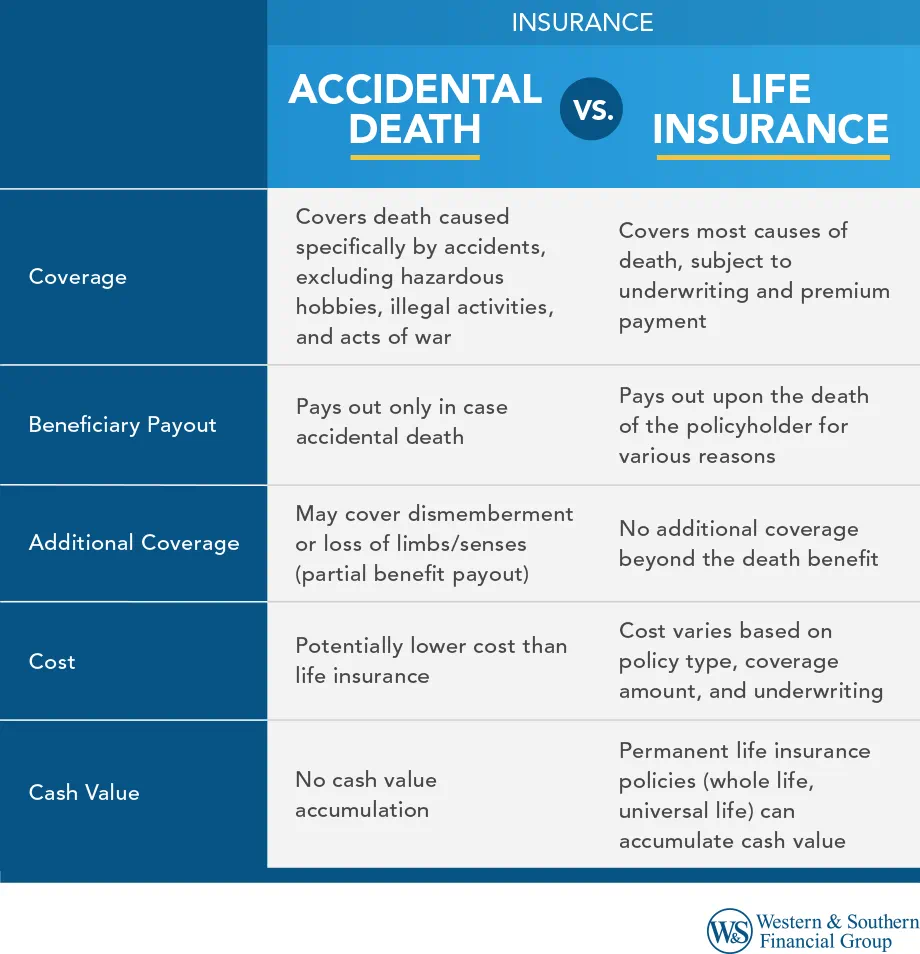

Key Takeaways
- Life insurance pays benefits to a chosen beneficiary upon the policyholder's death, covering most causes of death after underwriting and premium payments.
- Accidental death insurance pays benefits for deaths caused by accidents, excluding hazardous hobbies, illegal activities, and acts of war.
- Accidental death coverage may have age limits, including dismemberment insurance with partial payouts.
- Life insurance policies can be term or permanent, with the latter options costing more due to cash value accumulation and loan features.
- The choice between life and accidental death insurance depends on individual circumstances.
At face value, the difference between accidental death insurance and life insurance may not be apparent. Although they might sound like the same product going by different names, their individual offerings are not the same. It's important to understand what each insurance type covers — and how it relates to your own needs — before you apply for one policy, the other or even both.
Life Insurance Coverage
Life insurance, whether term or permanent, pays benefits to a chosen beneficiary upon the death of the policyholder.
Life insurance is meant to cover most causes of death, provided the policy has (typically) gone through an underwriting process and been approved, and the policyholder has paid all their premiums to date.
Life insurance can be purchased either individually or through an employer (if offered), and is generally subject to underwriting.
Accidental Death Insurance Coverage
Accidental death insurance pays when death occurs specifically as the result of an accident, but will typically exclude hazardous hobbies, illegal activities and even acts of war. Each insurance provider and policy has its own list of covered accidents, which might include car accidents, falls and accidental poisoning.
Some providers also offer accidental death and dismemberment insurance. In this case, an injury must have left you blind, deaf, mute or missing a body part in order to qualify, at which point you'd receive a portion of the full benefit. That portion will vary between policies, but it could be somewhere around 50 percent.
Unlike life insurance, accidental death coverage generally has an age limitation associated with the benefit, depending on the insurance company. But similar to life insurance, accidental death insurance can be purchased either individually or through your employer (if offered), with costs and benefits varying.
What Other Differences Are There?
These insurance types also differ in how they work. With life insurance, someone purchases a particular benefit amount and benefits are paid upon their death. The cost can vary depending on the type of life insurance policy they purchase (such as term, whole or universal).
With term life insurance, the policy lasts for a set period of time — including 10, 15, 20, 25, 30 or 35 years. However, if the term expires before the policyholder passes away, they surrender both the premiums and the benefit. Whole and universal life are permanent, and can cost more because they build cash value and can allow the policyholder to take out loans against them. It's worth bearing in mind that loans taken out against a life insurance policy will accrue interest, may create an income tax liability, and could reduce the policy's account value and death benefit. The policy must have a sufficient account value and premiums to cover insurance costs and charges.
The best policy for you will depend on your overall financial strategy. But once you purchase permanent coverage, the insurance company will pay the death benefit — minus any withdrawals or loans — no matter the age at which you pass away, as long as the policy hasn't reached its maturity date and other conditions have been met (be sure to read and understand all the terms of whatever policy you consider).
Accidental death insurance could cost less than life insurance, but that's not a guarantee, and it only provides benefits for specific scenarios. For instance, if you died in a car accident but it was somehow determined the accident was caused by a heart attack, the policy would not pay at all.
Choosing Your Policy
Exactly when you decide to purchase life or accidental death insurance — and which type you choose — could depend on different life stages and major life events. For instance, getting married, having children, experiencing a change in income or transferring business ownership are all major transitions that may get you thinking about the different types of insurance coverage available to you. Each of these life changes can introduce new loved ones who depend on your support, or even affect your ability to provide support, so it's important to plan for both your future and that of your loved ones.
Whatever your reasons for exploring new policies, you may want to meet with a financial representative to help build your overall financial strategy.
Prioritize your needs with a tailored life insurance strategy. Get a Free Life Insurance Quote


































